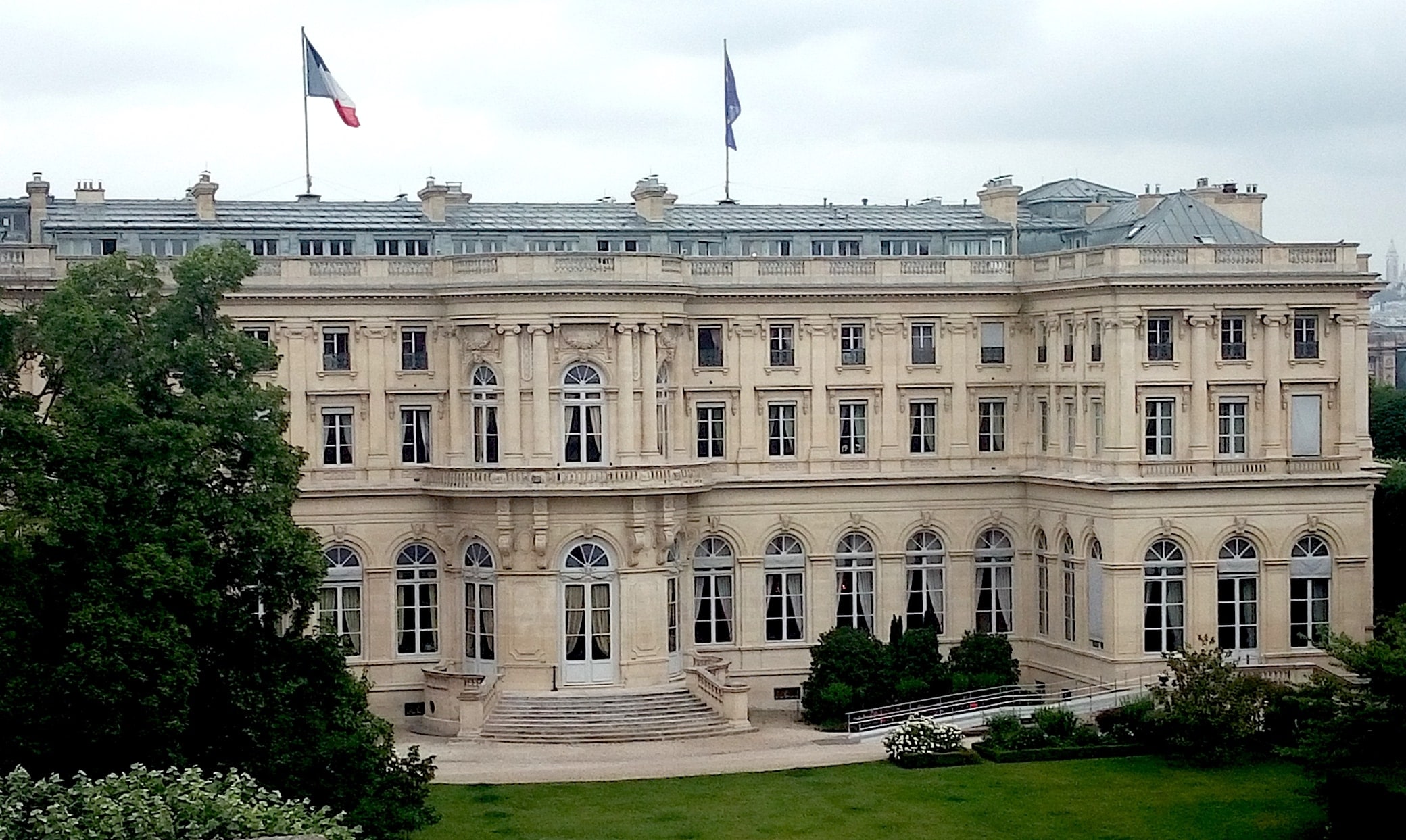June 2019 Unconference
Two days at the edge of the fight against information manipulation
Summary
- The team of the French Ambassador for Digital Affairs hosted an unconference at the Ministry for Foreign Affairs on June 27th and 28th, 2019.
- It gathered 50 practitioners from various backgrounds, including social researchers, engineers, NGOs, officials, diplomats, public actors and social media platforms.
- It also hosted the first non-US workshop of the Social Science One research program with data opened by Facebook.
- All participants interacted, shared and learned from one another through collaborative, open formats.
Download a summary of the discussions
Below is the original invitation.
It is the right time to share, learn, improve and build
- After EU parliamentary elections that did not show major signs of disinformation campaigns, but before many other major elections in EU countries…
- After new platform rules for political ads transparency, but before any fine-grained data is shared with researchers…
- After dozens of awareness raising articles and political discourse, but before any large-scale education campaign has reached the public…
- After initial laws in some member states, but before the first impact assessment of the European Code of practice…
There have been many great transatlantic conferences for showcasing studies, trying to quantify the impact of disinformation, and discussing whether “fake news” were dealt with and what the next stages of manipulation were.
We want to create a specific space for practitioners to share their practices, tools and experiences in reacting to disinformation campaigns, attributing their source, and preventing their impact on the public. We will also host an open hackathon, during which Facebook will offer a training workshop on the use of the data prepared for its collaboration with Social Science One.
The Office of the French Ambassador for Digital Affairs, building open tools against information manipulation, invites you for two days focused on the ways in which we can actually decrease the amount of disinformation citizens are confronted to on a daily basis, today and the day after.

Schedule
June 27th: Reaction, Attribution & Prevention Open Space Forum
On this first day, we want participants to share their experience and best practices starting from that moment where they have spotted nasty behaviour. We expect the following topics to be covered:
- Digital and physical war rooms: are they sustainable? Can we collaborate across organisational silos?
- Elves: are they efficient when grassroots? Are they ethical when coordinated?
- Rebuttals & denials: when are they useful? When do they backfire?
- Facebook’s Third-Party Fact-checking tool: how does it look like from the inside? What are the most accurate measures of views impact after journalists have flagged content?
- Data voids preemption: is it possible to pre-position alternative narratives? When is it questionable?
- Forensics: how far should attribution and reaction be decorrelated? Does attributing help in countering a campaign?
- Educational tools: have serious games and MOOCs proven effective? Are “nutritional labels” of journalistic practices the way forward?
- OSINT researchers: what are the risks taken by individuals who uncover networks? How can they be supported?
- Social network operators flagging: how effective are standard channels? Privileged escalation channels?
The format for this first day will be Open Space Technology: there will be no presenters and attendees, only participants. This format supports much deeper interactions, shaping the conversations around sharing knowledge rather than making assumptions on the audience. You do not need any prior experience with “unconferences” to participate.
June 28th: Research Hackathon
On the second day, we will host a “research hackathon”. On this occasion, you will be part of teams of social science researchers, developers, data scientists, and other skilled individuals interested in studying and countering disinformation.
You should come if you are interested in exploring ways to make sense of information manipulation, helping make such manipulation more understandable to the public, or building tools to counter it. In particular, you should come if you know how to:
- Conduct social science research on information diffusion on digital social networks
- Do data science or datafiddling
- Create dataviz or drawings
- Use API plumbing
- Build chatbots
- Make half-baked public-facing websites in half a day
- Write about fact checking and debunking misinformation
- Ask good, hard questions
As a single day is unfortunately too short to publish credible, peer-reviewed research on the impact of social media on elections, the main goal for studying will be to identify practical hypotheses that can be investigated using available data and tools, and prototype ways to test them.
Members of Facebook’s Election Research Commission team will join the hackathon to introduce the most recent data and tooling available from Facebook, via the company’s collaboration with Social Science One and the Social Science Research Council. This will allow participants to generate more likely to be answerable research hypotheses and includes, by order of availability:
- The Ads Library, which is available to all ID-verified researchers and developers.
- The CrowdTangle API, which will be available to all participants during the hackathon and to registered researchers after it.
- The data in the Research Tool, which will be available to all participants during the event only, is a synthesized and sampled version of the Social Science One URL shares data set. This dataset will allow researchers to understand the shape of the data available and its potentials, as well as understand how to conduct research in a differentially private system. In order to test the hypotheses, the full data will be made available to researchers who are accepted into the Social Science One program through the Social Science Research Council.
You can also use public sources such as:
- Twitter’s political advertisers.
- Several millions of troll tweets and accounts.
Agenda
- 08:15 – 09:00
- Welcome coffee.
- 09:00 – 09:15
- Start (sharp on time!). Description of specific requirements for datasets.
- 09:15 – 09:30
- Break into groups with similar areas of interest.
- 09:30 – 11:00
- For teams that want to use the URLs dataset, training on the details of the Research Tool. For others, hack!
- 11:00 – 11:30
- Side event in a dedicated room: flash talks from Social Science One researchers about their research plans.
- 12:00 – 17:00
- Hack!
- 12:00 – 14:00
- Lunch available 😋
- 17:00 – 17:30
- Wrap up and make sure you have a demo.
- 17:30 – 18:30
- Demos and closing remarks.
Specific access requirements
If you want to access the Ads Library API, you must have your identity verified by Facebook ahead of the event. This typically takes 1 to 2 days.
You will need a Facebook account. Indeed, Facebook uses their users’ accounts to give developer privileges. Create a Facebook account with your real name and birth date if you do not have one yet. Then, follow the instructions on the Ads Library API page.
Logistics
Venue
These two days will take place in the Hôtel du Ministre of the French Ministry of Europe and Foreign Affairs, at the Quai d’Orsay in the heart of Paris.

Dates, time, food
On Thursday the 27th of June, doors will open at 9:30 with coffee, and the day will start at 10:15. We will close at 18:30. Lunch will be provided.
On Friday the 28th of June, doors will open at 8:15 with coffee, and the day will start at 9:00. We will close at 18:30. Lunch will be provided.
Access
The hours we chose aim to support participants in using low-carbon transportation means. In order to reach the venue:
- From Brussels, you can take the 7:43 Thalys train and 19:25 back.
- From Amsterdam, you can take the 6:15 Thalys train and 19:25 back.
- From London, you can take the 5:40 Eurostar train and 20:01 back.
These trains reach Gare du Nord, from which you can reach the Invalides metro station in 20 minutes with RER C and RER B, connecting through Saint-Michel-Notre-Dame.